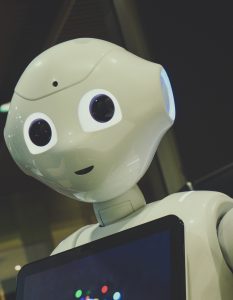The year 2019 marked the 30th anniversary of the World Wide Web. Entering a new decade presents an opportunity to reflect on what major Internet Governance trends were relevant for libraries over the course of the last year, and how me might see these trends take shape in the coming future.
Reckoning with the ‘techlash’
Already in 2018, ‘techlash’ – “a strong and widespread negative reaction to the growing power and influence of large technology companies, particularly those based in Silicon Valley” – made it to the Oxford Dictionaries’ Word of the Year shortlist. 2019 saw the phenomenon grow, with tech giants facing more scrutiny and pressure to address a wide array of challenges, from privacy to misinformation, as well as an increase in privacy and data protection investigations that tech giants face.
Facebook was handed an unprecedented fine by the US Federal Trade Commission for privacy violations linked to the Cambridge Analytica scandal; privacy complaints in relation to Google’s online advertising practices were filed to data protection regulators in several countries in the EU; EU antitrust regulators launched an investigation into Google’s data collection and use; the Data Protection Commissioner in Ireland opened a third investigation into Apple over privacy concerns – these are just a few examples of the increasing pressure the tech industry is facing.
How exactly the increasing pressure will shape the work of online platforms remains to be seen. For example, responding to growing concerns over political advertisements (particularly in the contexts of misinformation and microtargeting), Twitter issued a near-full ban, Google limited the scope of targeting to general data, while Facebook has so far excepted most political advertisements from fact-checking.
Such concerns – in particular online platforms’ handling of user data and privacy – have relevance for the library sector. To give a prominent example, 2019 saw American and Canadian strongly and vocally oppose LinkedIn’s changes to a popular online education platform Lynda.com because of privacy and confidentiality concerns. The introduction of planned changes has since been paused.
Overall, the views on the ‘techlash’ narrative may vary: whether it can meaningfully stir the internet towards openness and inclusivity, and whether the regulatory initiatives it prompted can have negative effects if not carefully assessed beforehand. In any case, 2019 saw the phenomenon gaining more momentum – and the upcoming policy responses can have a significant impact on the shape the internet will take in the future.
A fragmenting internet?
In her speech at the 2019 IGF, Federal Chancellor Dr. Angela Merkel pointed out the efforts of some state actors to “seal their nets off from the global internet”. An increasingly fragmented internet can have various negative consequences, she warned, from surveillance to infrastructure vulnerability to censorship.
The concerns over ‘splinternet’ are not new – but 2019 saw a number of prominent government initiatives to exercise control over the internet within state borders (and at times beyond). On the one hand, there are the much-cited examples of China’s Great Firewall and Russia’s reportedly successful test of a country-wide alternative internet in December 2019.
A parallel issue is internet shutdowns – a growing phenomenon, jumping from 75 instances in 2016, 106 in 2017, to 196 in 2018. The trend continued in 2019; while the final tally is yet to be offered (the Shutdown Tracker Optimization Project counts 128 between January and July), we already know that the year saw a record for longest shutdown in a democracy, as well as other shutdowns across South Asia, the MENA region, Sub-Saharan Africa and beyond.
Fragmentation can go much deeper than these readily apparent cases, though. A landmark 2019 Internet and Jurisdiction report points out that the internet can become “less borderless” due to both technical and regulatory developments. The latter includes fractured and diverse state-based norm setting in such areas as extremist content and hate speech online, privacy, defamation, misinformation, and other matters related to online expression – as well as those related to security and economy. The jurisdictional tensions can give rise to increasing legal uncertainty, which
“increases the cost of doing business and creates challenges for governments seeking to protect their citizens and ensure respect for their laws. It may also prevent internet users from accessing as broad a range of content, as they otherwise could, and raises civil society concerns that abuses are not properly addressed, or that attempted solutions will harm users.”
The questions surrounding both internet shutdowns and fragmentation are relevant for libraries. In the short term, shutdowns and slowdowns prevent libraries from going their job fully; and fragmentation can impact libraries working to make digital materials available across borders, potentially obliging them to cope with laws and other rules from a wide variety of jurisdictions.
In the long run, both trends can mark major steps backwards from wider access to knowledge and information. Future regulatory efforts in these areas can therefore have a significant impact on their work – and it remains to be seen how these trends evolve in 2020.
Governance of new technologies, applications and services – as well as data
Throughout 2019, the Geneva Internet Platform’s Barometer of Trends repeatedly marked an increase in relevance of new technology issues – such as those pertaining to AI and Internet of Things – within internet governance discourse. In the last few years, new applications have prompted engaged and contested political conversations due to their potential societal, political, economic and cultural impacts.
To name one example: 2019 saw increased public concerns over the risks associated with facial recognition technologies, particularly in the areas of privacy and non-discrimination. Several cities in the US banned the technology, while elsewhere, different countries’ regulatory stances are diverse.
As regulators and the society at large continue to grapple with the questions of new technologies’ ethical and societal implications in 2020, libraries can follow (and take part in) the discussions. This ensures that libraries interested in adapting and making use of new technologies and services can make informed choices that align with core library values and patrons’ interests.
In addition, some predictions foresee that privacy and data regulation policy debates will intensify. While the EU General Data Protection Regulation will have already been in effect for two years in 2020, the California Consumer Privacy Act only came into effect on January 1, 2020, and other regulations are still under deliberation – e.g. India’s consultations on the Personal Data Protection Bill and other U.S. states considering their own privacy regulations. In light of the questions that the era of Big Data poses for libraries, particularly around privacy, it may well be worthwhile for the library sector to keep track of how this policy field develops further in the coming year.
These are some of the key Internet Governance trends from 2019 that may see further developments in 2020 – and can have implications for the library sector. The internet remains crucial to libraries – both in their daily work and in relation to their broader values of access to information and intellectual freedom. That is why in the coming year IFLA will continue to engage with Internet Governance forums – and encourages libraries to get involved in internet governance platforms and discussions as well!
 Artificial Intelligence (AI) – systems able to collect and analyze structured or unstructured data and make decisions based on that information to achieve a defined goal
Artificial Intelligence (AI) – systems able to collect and analyze structured or unstructured data and make decisions based on that information to achieve a defined goal Artificial intelligence (AI) systematically tops popular lists of the most important emerging technologies. With a mix of fear and excitement, commentators seem to agree that it will shape the future, although not always on how.
Artificial intelligence (AI) systematically tops popular lists of the most important emerging technologies. With a mix of fear and excitement, commentators seem to agree that it will shape the future, although not always on how.